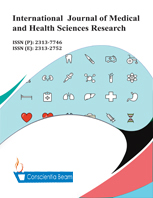Comparison of Psychiatric Comorbidity and Quality of Life (QOL) in Persons with Tuberculosis and People Living with HIV in South-South Nigeria
DOI:
https://doi.org/10.18488/journal.9.2018.51.1.17Abstract
BACKGROUND: Tuberculosis and HIV are two chronic infective medical diseases commonly associated with psychiatric co-morbidity, which further affect the quality of life of the sufferers. AIM: The study was to determine and compare the relationship between psychiatric co-morbidity and quality of life in persons with tuberculosis and PLWHIV. METHODOLOGY: Two hundred and thirty subjects living with HIV and 140 subjects with tuberculosis were recruited. Those with clinically chronic conditions, or comorbid medical condition and treatment Resistant tuberculosis were excluded. Subjects were further administered with the study’s instruments including the socio-demographic questionnaire, GHQ-12, the brief version of the WHO Quality of Life instrument (WHOQOL-Bref) and WHO Composite International Diagnostic Interview (WHO CIDI). Results were presented via descriptive and analytical methods. RESULTS: The study found a prevalence of psychiatric co-morbidity of 19.8% among PLWHIV and 28.4% among subjects with tuberculosis (p = 0.004). For the PLWHIV, domain scores for quality of life were as follows; 60.71±15.57, 62.34±26.32, 61.57±25.04, 55.15±14.00 and 65.81±21.84 while tuberculosis was 50.97±13.87, 57.22±46.36, 54.51±45.04, 50.01±15.10 and 49.34±21.84 (p = 0.001) for physical, psychological, social relationship, environment domains and general health facet respectively. Furthermore, presence of psychiatric comorbidity significantly inversely correlated with quality of life among persons with both medical diseases. CONCLUSION: The study found a statistically significant higher prevalence of psychiatric co-morbidity and lower quality of life among the subjects with tuberculosis compared with PLWHIV. Findings suggest strongly that in managing patients with these conditions, attention should be paid to their mental health and subjective quality of life.

